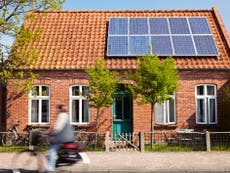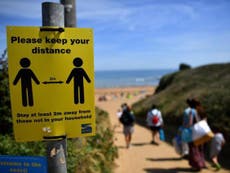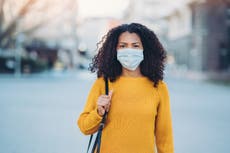Here’s how we can help the Covid-19 recovery, tackle the climate crisis and fight disillusionment with our democracy
As we take stock of what we have learnt during this crisis, we must leverage this to change the way we do things – including the way parliament works

There was a striking opinion poll back in April when people had experienced the first weeks of lockdown. What did they want when the coronavirus crisis was over? Only 9 per cent said they wanted life to go back to “normal”.
So we know what people don’t want. The challenge now is to find out what they do want.
As many have acknowledged, this is a pivotal moment where we can address two global crises – coronavirus and the climate emergency, which may have disappeared from the front pages but has not gone away. If anyone needed reminding of how dangerous the climate crisis is, land surface temperatures of up to 45C have been recorded in the Arctic this week, something that is truly terrifying.
We can use the need to restart our economy in the wake of Covid-19 in a way which also addresses the climate crisis. But I believe there is a third priority too.
We’ve learnt in the past four months that real change can happen fast, in both government and the public, where there is a shared necessity and a common will. As we take stock of what we have learnt during this crisis, we must leverage this to change the way we do things – including the way parliament works.
The disillusionment with our democracy is profound. Too often, people feel they just don’t count and nor do their views. They have no control over key areas of their lives, and politics is something that is done to them, not with them.
This isn’t healthy for our democracy and it will stop us successfully tackling the climate crisis, when time to take effective action is rapidly running out. Effective action could not be more urgent. This is the last decade where we have a serious chance of avoiding the worst of climate change. If we bungle it and throw away the opportunity to do things differently now, we will have squandered what is probably our last chance to get off this dangerous path.
If we are to transform our society and our economy in the way that’s needed to protect and restore nature and our climate while improving people’s lives and life chances, people need to know they are being heard and that they have a stake in the future of this country. More than that, addressing the challenges we face needs all of us.
That is why the Reset inquiry from the parliamentary group on the Green New Deal that I co-chair with the Labour MP Clive Lewis, isn’t just about producing proposals on how to re-emerge from coronavirus in a way that’s fairer, greener and more sustainable. It is about a whole new approach to change that treats citizens as partners in the process.
It involves surveys, opinion polls, online workshops where people can explore and develop proposals in key areas, or write to us with their ideas. We’ll hold virtual evidence sessions where we will hear from a wide range of voices, including those whose expertise comes from their own lived experiences.
But we want to go further than just consultation. If we are to fundamentally change our society, as we must, we need to actively engage with people from the start, using their experiences and expertise in the process of deciding what steps to take next. And we need to give them a meaningful stake in, as well as control of, the changes that happen, rejuvenating democracy in the process.
The UK’s citizens’ assembly on climate, which began meeting in January, starts to show what’s possible when you do that. A hundred and eight citizens, of all ages, races, backgrounds and views, have been meeting to discuss how the UK can meet its mandated target of net-zero greenhouse gas emissions by 2050. Their interim report, on how to rebuild the economy post-coronavirus, was published this week.
What was noticeable was not only the level of engagement, but how closely their recommendations were echoed in the progress report of the government’s own advisers, the Committee on Climate Change, two days later. If people are given the time to discuss complex issues, and presented with evidence, they can come up with solutions to the most intractable problems and feel ownership of those decisions.
We need that engagement and understanding if we are to successfully tackle the climate emergency, and tackle the corrosive levels of inequality that blight our country. So before we return to clogged streets, crowded shops and polluted air we want people to tell us now about the changes they are looking for as part of an open dialogue about the future of our country, and in particular how we might use this once in a generation opportunity to make it fairer and greener.
We want to start the process of putting power back into communities, creating the connections and structures that will underpin lasting change.
The public response to coronavirus has shown that people can not only be trusted to take the right actions for the sake of their own safety and others, we are also capable of extraordinary levels of innovation, kindness and generosity. Reset presents an opportunity for our voices and our actions to matter. Working together, we’ll make sure the government listens.
Caroline Lucas is the Green Party MP for Brighton Pavilion








Join our commenting forum
Join thought-provoking conversations, follow other Independent readers and see their replies